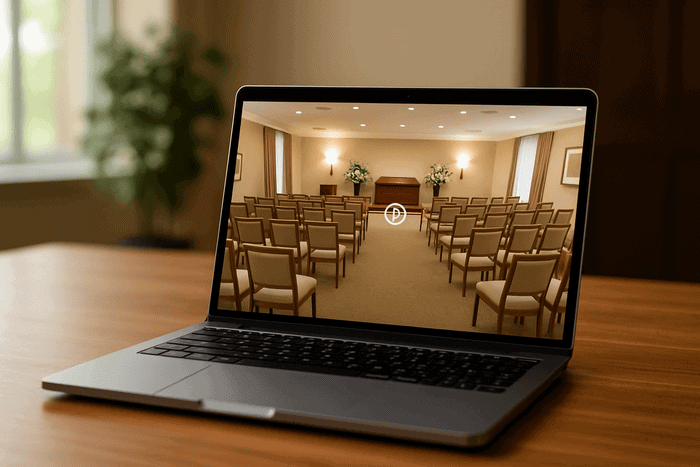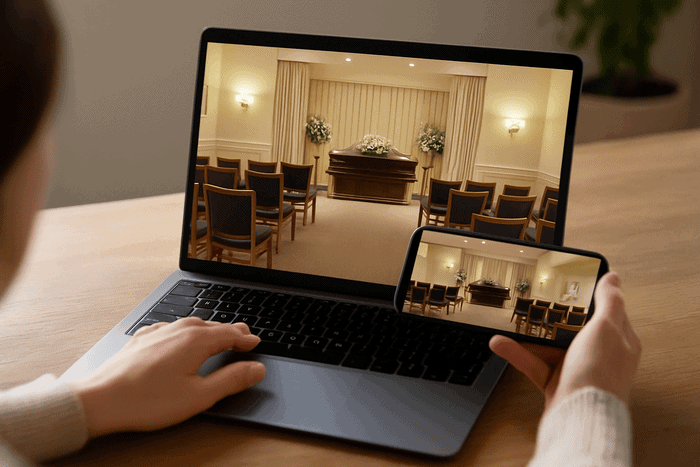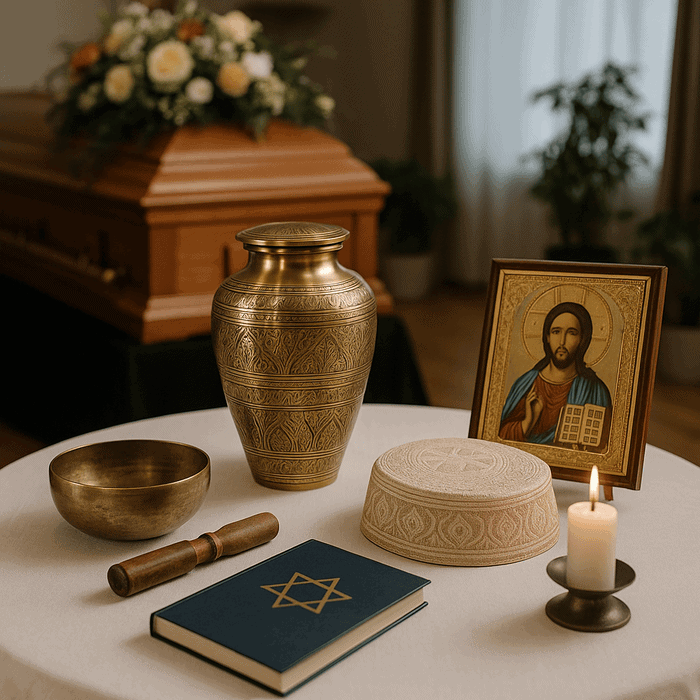Virtual Tours of Funeral Homes

Cultural Sensitivity in Funeral Homes
May 13, 2025
Community Outreach by Funeral Homes
June 1, 2025Choosing a funeral home carries weight. It’s not just a practical decision – it’s deeply personal. Families want to know where their loved one will be remembered. They want to feel comfortable, supported, and respected by the environment and the people in it.
Virtual tours make that possible, even from miles away. Originally a response to pandemic restrictions, they’ve become a valuable tool for families who need to compare options quickly, include relatives from different locations, or avoid emotional strain from in-person visits.
Remote planning no longer means sacrificing connection. It means gaining control at a time when most people feel like they’ve lost it.
What Are Virtual Tours of Funeral Homes?
Virtual tours let families explore funeral homes online before ever setting foot inside. They’re not just photo galleries—they’re immersive, guided walk-throughs. Some use 360-degree video. Others offer interactive floor plans or real-time video calls with staff.
Most are hosted directly on the funeral home’s website. Some tours are self-guided, while others are led by a funeral director via live video. Whether it’s virtual reality or a detailed slideshow, the goal stays the same: helping families visualize the space and understand what’s offered.
A good tour shows more than walls and furniture. It gives families a sense of tone, hospitality, and care.
Why Are Families Using Virtual Tours?
The demand comes down to convenience, comfort, and timing.
- Travel isn’t always an option. Out-of-state relatives often want input, but can’t fly in quickly.
- Time matters. Funeral decisions sometimes need to be made within hours—not days.
- Health concerns linger. For immunocompromised family members, walking through multiple facilities isn’t feasible.
- Grief makes logistics harder. Visiting several homes in person can feel overwhelming, especially when emotions are high.
Virtual tours help people move at their own pace. They create space to reflect, compare, and ask questions—without pressure or exhaustion.
Key Features to Look For in a Funeral Home Virtual Tour
Not every virtual tour offers the same depth. Some skim over key spaces. Others feel staged or impersonal. The best ones feel clear, welcoming, and easy to navigate.
Viewing Facilities and Amenities
Families should look for real details, not just wide-angle beauty shots. Does the chapel feel intimate or expansive? Are family lounges available for private moments? Is there a reception area for gathering afterward? What about accessibility—ramps, restrooms, and parking?
The tour should walk through all of it, showing how the space serves both small gatherings and larger services.
Assessing Cleanliness and Atmosphere
The environment speaks volumes. Is the space well-lit? Are the rooms maintained? Do flowers look fresh, carpets clean, and furniture thoughtfully arranged?
Virtual tours provide an honest look at how the home feels, from décor and lighting to overall warmth. Families should pay attention to their gut reaction. If the space doesn’t feel peaceful, it probably won’t feel right when they’re grieving.
Learning About Services Offered
Some tours go beyond visuals. They include staff introductions, video clips of past services, or detailed overlays describing available funeral packages, cremation options, or memorial service amenities.
That kind of transparency helps families align their values with what the home offers. It turns a generic tour into a personal preview of care.
Benefits of Virtual Tours for Funeral Planning
Virtual tours of funeral homes do more than show spaces – they simplify decisions when emotions are high and time feels tight. For many families, the planning window is short, the choices are overwhelming, and travel isn’t realistic. Virtual tools offer structure and clarity in the middle of grief.
By viewing multiple homes from home, families can slow down, bring more people into the process, and avoid making rushed choices they might regret later.

Convenience and Accessibility
Not everyone can drop everything to visit a funeral home in person. Relatives may live across the country. Older family members may have mobility concerns. Even local visits can be hard to fit in during a week already packed with planning.
A virtual tour makes the process easier. Families can explore a location in minutes, revisit it anytime, and even share links with others. They get access without stress, on their schedule, from wherever they are.
Informed Decision-Making
When you’re under pressure, making a confident decision gets harder. Virtual funeral planning gives families more time to evaluate what really matters.
Seeing a chapel layout, comparing funeral home amenities, or previewing service areas helps them picture the experience more clearly. It’s not just about choosing a building, it’s about feeling comfortable with where memories will be made.
Knowing what to expect reduces anxiety. It helps families focus on honoring their loved one instead of second-guessing every detail.
Comparing Multiple Providers Easily
Visiting five funeral homes across town can take days. Viewing five virtual tours takes less than an hour. That kind of efficiency matters when time, energy, and clarity are in short supply.
Families can review each option side-by-side, discuss them with others, and make decisions with fewer compromises. The ability to compare funeral homes online removes guesswork, and often leads to better outcomes.
Tips for Getting the Most Out of a Funeral Home Virtual Tour
A strong virtual tour offers a full view of the space, but getting the most out of it means coming in prepared. The best experiences happen when families take an active approach.
Prepare a List of Questions in Advance
Before clicking into a tour, jot down what matters most. That might include:
- Cremation pricing and package details
- On-site services vs. third-party partnerships
- Private viewing options or family rooms
- Policies for religious or cultural customs
Having a list ensures important details don’t slip through the cracks, especially if emotions run high during the review.
Take Notes During the Tour
Write down first impressions, questions, and anything unclear. Not every tour includes voiceover or text, so some things might need clarification later.
Pay attention to how the space feels. Is it peaceful? Too large? Too clinical? Tracking reactions helps compare options later without relying on memory.
Follow Up With a Live Call or Visit
A virtual tour starts the process, it doesn’t finish it. Reach out to ask specific questions or schedule a follow-up conversation with staff. Some families also choose to confirm details with a short in-person visit once they’ve narrowed things down.
That extra step can make a big difference. It confirms trust, ensures alignment, and gives families peace of mind before final decisions are made.


